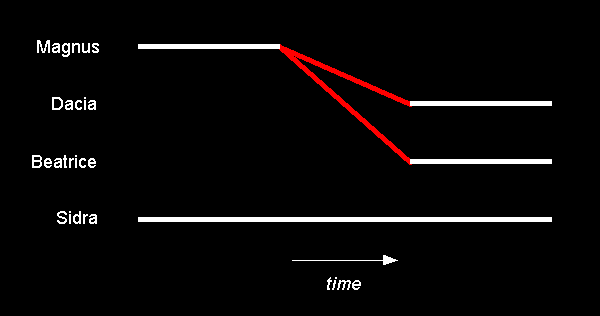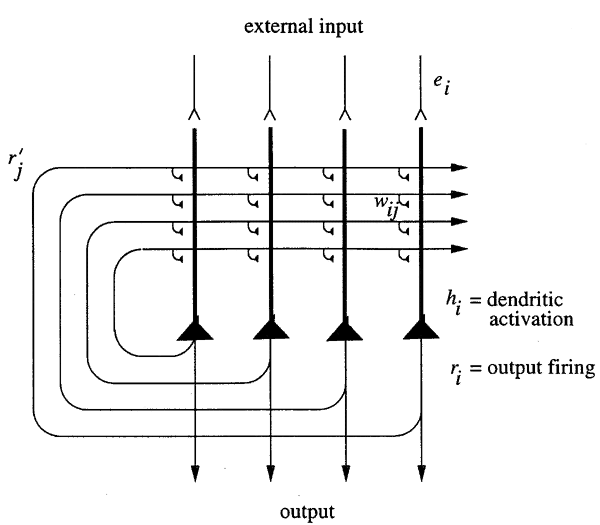That view elevates the subjective experience of time above the objective fact of time. It's solipsism. The existence of 13.7 billion years of pre-human objective time speaks against that solipsistic view with sufficient authority. If you feel a need to argue for the solipsistic view, please try the literature before innovating.
My view, which I haven't yet found any reason to doubt, is that my subjective is just as real as anything else in the world. There are differences though, the subjective is (as it seems at least) temporal, as it relies on a process. However, that doesn't make it less real, it exists just as much as a stone exists, or anything else in the objective world. The subjective is also (as far as we know) a delicate process which seizes to exist when that process is severely altered, or stopped (though the remains of the process goes on into other forms).
Do you disagree on the above view of what subjectivity is?
Now, if we break a rock then that rock is still a part of the world but in smaller pieces, but if we break the process of subjectivity then the subjectivity that the process offered is no more a part of this world though the pieces of the process is (in other forms).
The consequence is that subjectivity can no longer be bound by time, as it doesn't exist. Something that doesn't exist is not a part of the world anymore, and therefor the world is not a part of the subject either (therefor the world ends,
for the subject, but we can equally well say that the subjectivity is before the world begins as before and after have no existence for the subject).
Your conception of enforcement is a decision which compels unfelt time-gaps to occur only in a same-structure body. It requires some active, if incomprehensible, enforcer, who (or what) does something. There's no good argument for such an enforcer.
I've never said that it had to be a active enforcer, it can be a natural process but my argument is that it can't be physical, as all physical things can be duplicated (even if the odds are slim).
The flow of time isn't an active decision-maker, like your enforcer. It is just an ordering which happens to contain James' unfelt time-gaps, passively.
That ordering requires that objective time still exists for the subject. There is no reason to distinguish physical nothing from subjective nothing, nothing can't be diversified so objective nothing (after the end of existence or before the beginning) is the same nothing as subjective nothing is. Could you provide any argument why this isn't so? How is one nothing different from another?
You misread the essay there in
Ch. 11. Subjectivity is unified throughout the essay, with no deviation from standard clinical descriptions.
The inferred passages are not alterations to subjectivity. Subjectivity itself is not being split or merged. The splits and mergers are only temporal conditions on the non-subjective interval of the time-gap.
As I put it in essay, when introducing merged passage:
``Thanos remains Thanos, regardless of who does or does not experience existential passage to him. It is more correct to say that Nicos and Magnus have experienced independent passages to the same recipient. Objectively, from without, we see the temporal and functional conditions which lead us to infer this two-to-one merger; but the participants themselves must be ignorant of the merger. The merger can only be known from without, as an abstraction.´´
I understand that subjectivity itself isn't being split or merged, a subject is a whole and can't be split. I already said that I agree that mergers could be possible, they don't lead to a paradox, I can myself have many existences within me that does exactly what I do and perceive exactly what I perceive without my knowledge of it. However, there is a huge difference between that and me existing as two persons, perceiving two lives, doing things through two bodies. That is what I am having a difficulty accepting and is also the argument that the idea isn't complete (although, as I said before, it is a good approach and is also a good framework, and has a potential of becoming complete with some modifications, mainly about the nature of 'nothing' which must then be 'something' or existence must be unique in a way that every existence is their own "mini-universe" and that they are...well...their own 'nothing', but I'm having trouble grasping that concept right now, it seems to rely on a underlying structure if that was the case).
If you still feel that something is wrong here, you're free to try to isolate it. But note well that there's nothing one can point to in the subjective experience of any passage participant that leads to a paradox. Putting it another way, there is nothing the participants could report that would constitute a paradox.
If I was subjective as two persons then I would report it, not as a paradox (as obviously then I couldn't say that it couldn't happen) but as a severe oddity.
Indeed, perhaps it doesn't seem like a paradox, we have two hands after all and can control them independently, two eyes and can see through both at the same time, etc., but while it may not seem like a paradox if we judge through experience, I still believe that we will find that it is still a paradox, I mean there are no obvious connection between those two persons besides being born at the same time, and our timelines diverge (time goes slower when we move, so we all live in slightly different times), but subjectivity has to be consistent so even though our timelines diverge, were you a subject of a body then you will always be the subject of that body, otherwise we would be slipping in and out of other peoples lives as we happen to cross their timelines and that just doesn't happen.
Thanks. I'm glad others also find it a good framework for addressing the issues.
You're welcome. It appealed to me on a very deep level and I've thought about these things for a long time (as I said before I knew about the unfelt time-gap even as a child and was terrified of it, but at the same time awed, many things have happened since that got me thinking about it and I've taken small steps to reach an idea that I believe can't be argued against, even though I let it be put through arguments all the time - I could be wrong, but I doubt it).
I have read about solipsism earlier but it doesn't encompass my idea fully, I do believe that others exists alongside me, but for that to be the case there are two mutually exclusive options; 1) we have a soul (which in this case is defined simply as a objective subjectivity and might or might not be the same as the religious soul and is almost certainly not physical) 2) we all live the life of all else (when I die I become someone else, that doesn't need to come after me but can be before me or at the same time as me), this means that all the objective persons that I encounter do have a subjectivity but it is my own self in different settings. This idea needs a unphysical "queue" to determine which I'm going to be next.
I'm in favor of the soul, because I dislike the idea of talking to myself all the time lol (j/k), I guess that Occam's razor would favor the queue though as it doesn't need a soul for each individual, it just needs a unphysical process of determining the next object to be the subject (so to speak), I have no clue as to what that process would be like (or if it is active or passive).
btw, what did you make of the old Druze precedent (
Ch. 2,
Ch. 10)?
Well, the ideas are sound, but it does make assumptions which needs to be sorted out, for example; does it really need to be a "fall from grace"? Do we really need to come down from the heavens? What if we started on earth as we had neither sin nor any good? Needless to say we all sin, but if the good can outweigh the sins or if we are somehow cleansed by the death of our body (which could be where the sins originate after all) then couldn't there be grace again? So there are flaws in the ideas but still a good read.
As I closing word I'd like to say that I do believe that there can be many existences, but that there can only be one nothing, the same nothing that was before existence and the same nothing that comes after existence. With existence in regard to nothing I mean existence itself as the container of all other existences (subjective or objective). To say otherwise is also to say that each existence has their own nothing, which means that the world is far different from what we thought (or at least from what we are taught).




